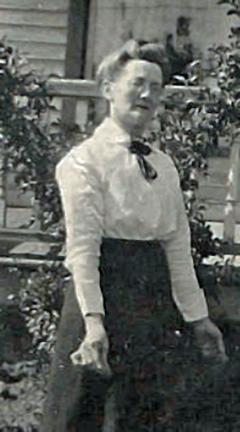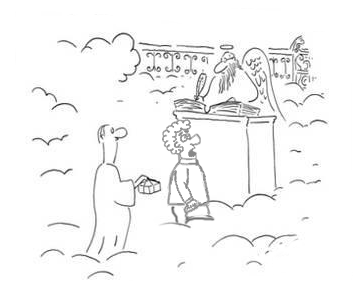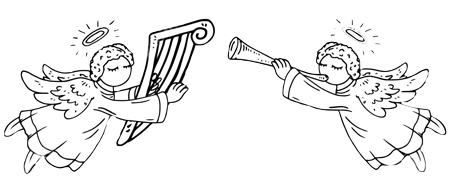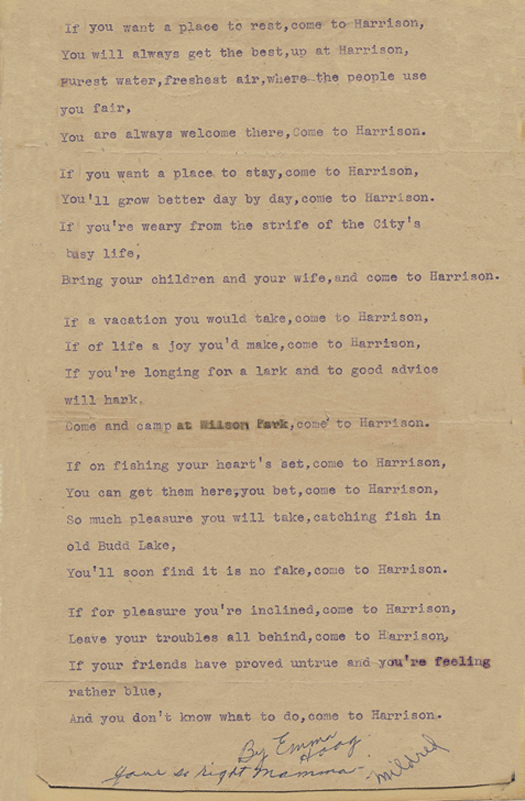
This is a collection of poems taken from Aunt Cathy's book, "Our Stepping Stones." Some are Grandma Hoag's originals, and some are just her favorites. I have listed here those of lighter nature. As I read through her collection, I found some to be too depressing . . . but that's just me. If you have a favorite and would like it posted here, please let me know and I will be happy to include it.
Thank you, Aunt Cathy, for gathering all this together. Enjoy!
I found a reference to the poem "Phebe," but it still doesn't provide an author. It may be likely that Emma Hoag had one of these books and liked the poem and just added it to her collections. You may browse here to view this version as well as other poems in this collection.
PAJAMAS
I'm sending Joe's pajamas,
I think he needs them worse.
And that's the only reason,
I'm sending his down first.
I'm going to send four more,
I mean four sets you see.
If Jane's should be too small for her,
She can give them to Onalee.
And when Onalee's get too small,
That they begin to hurt her,
Of course the obvious thing to do,
Is pass them on to Berta.
When Berta has out grown them,
As she will sometime I know,
the only thing that you can do
Is to hand them down to Joe.
And Joe, when he is done with them,
I know he won't be mean.
He'll let you patch them up a bit,
And give them to Ernestine.
And if she doesn't like them,
In case they are to sloppy,
You can cut the legs off from the pants,
And make some shorts for Hoppy.
When Hoppy has discarded them,
I think 'twill be time to stop.
You can take what there is left of them,
And put them in the mop.
The Dollies Bazaar
We were going one Saturday ever so far,
My mama and I to the Dollies Bazaar.
There were twenty waxed dollies, the loveliest show,
Went walking about as you wound them, you know.
You wouldn't believe half the things they could do,
One said "good morning" as plainly as you.
One played the piano, and one dressed in lace,
Walked up to the mirror and powdered her face.
Well when we were ready and stepped in the hall,
There was a lady a comin' to call.
She said she just chanced to be passin' that way,
And really had only a moment to stay.
Well we waited and waited and hoped she would go,
For we knew it was almost time for the show.
We could hear the clocks striking all over the town,
And knew that the dollies would soon be run down.
So I just said, "I suppose, Mrs. Black,
Your little girl wonders why you don't come back."
That's all that I said, every dentical word.
She said, "little girls should be seen and not heard."
My mama looked queer,
But that ended the call.
And we went to the Dollies Bazaar
After all.
And where are your berries, child.
You sure could not have sold them all,
You had your basket piled.
No mother, as I climbed the fence,
The nearest way to town,
My apron caught upon a stake,
And so I tumbled down.
I scratched my hands and tore my dress,
And still did not complain.
And had my blackberries been safe,
Would not have cared a grain.
But when I saw them on the ground,
All scatted by my side,
I picked my empty basket up,
And down I sat and cried.
Just then a pretty little Miss,
Chanced to be passing by.
She stopped, and stooping tenderly,
She begged me not to cry.
And must be sadly hurt?
Ah' no, but see my fruit,
All mixed with sand and dirt.
Well, do not grieve for that, said she,
Go home and pick some more.
Ah' no, for I've stripped the vines,
These were the last they bore.
My father, Miss, is very poor,
He works in yonder stall.
He has so many little ones,
He cannot clothe us all.
I've often longed to go to church,
But never could I go.
For when I asked him for a gown,
He'd always answer no.
There's not a father in the land,
That loves his children more.
I'd get you one with all my heart,
But Phoebe, I am poor.
He said to me one day,
Phoebe, if you will take the time,
That is given you to play.
To gather blackberrries
And carry them to town,
To buy the bonnet and the shoes,
I'll try to get the gown.
Oh! Miss, I fairly jumped for joy,
My spirit was so light,
And so when I had leave to play,
I picked with all my might.
I sold enough to buy the shoes,
About a week ago.
And these, if they had not been soiled,
Would buy the bonnet too.
But now they're gone, they all are gone,
And I can get no more.
And Sundays, I must stay at home,
Just as I did before.
As hard as I could cry.
And looking up, I saw a tear,
Was standing in her eye.
She snatched her bonnet from her head,
Here, here take this she cried.
Ah' no, I'm afraid your Ma,
Would be offended, Miss.
My ma? No never,
She delights all sorrow to beguile,
Tis' the sweetest joy she feels,
To make the wretched smile.
She taught me when I had enough,
To share it with the poor,
And never let a needy child,
Go empty from the door.
And so, I took it, here it is,
For pray, what could I do,
And mother, I shall love that Miss,
As long as I love you.
St. Peter At The Gate

St. Peter stood guard at the golden gate,
With solemn mien and an air sedate.
When up at the top of the golden stair,
A man and woman ascending there
Applied for admission. They came and stood
Before St. Peter, so great and good,
In hopes the city of peace to win,
And asked St. Peter to let them in.
The woman was tall and lank and thin,
With a scraggly beardlet upon her chin.
The man was short and thick and stout,
His stomach was built so round and out.
His face was pleasant, and all the while,
He wore a kindly and pleasant smile.
The choirs in the distance the echoes woke,
And the man kept still while the woman spoke.
"Oh! thou who guardist the gate," said she,
We two come hither, beseeching thee,
To let us enter the heavenly land,
And play our harps with the angel band.
Of me St. Peter, there is no doubt,
There's nothing from heaven to bar me out.
I've been to meeting three times a week,
And almost always, I'd rise and speak.
I've told the sinners about the day
When they'd repent of their evil way.
I've told my neighbors, I've told them all,
About Adam and Eve, and the primal fall.
I've shown them what they have to do,
If they'd pass in with the chosen few.
I've talked and talked to them loud and long,
For my lungs are good, and my voice is strong.
So good St. Peter, you'll clearly see,
The gate of heaven is open to me.
But my old man, I regret to say,
Hasn't walked in exactly the narrow way.
He smokes and he swears, grave faults he's got,
And don't know whether he'll pass or not.
He never would pray with an earnest vim,
Or go to revival, or join in a hymn.
So I had to leave him in sorrow there,
While I with the chosen unite in prayer.
He ate what the pantry chanced to afford,
While I, in my purity, sang to the Lord.
But, Oh! St. Peter, I love him so,
To the pleasures of heaven, please let him go.
I've done enough, a saint I've been,
Won't that atone? Can't you let him in?
By my grim gospel, I know 'tis so,
That the unrepentant must fry below.
But isn't there someway that you can see,
That he may enter, who's dear to me?
It's narrow gospel by which I pray,
But the chosen expect to find some way,
Of coaxing or fooling or bribing you,
So that their relation can amble thru.
And say, St. Peter, it seems to me,
This gate ain't kept as it ought to be.
You ought to stand by that opening there,
And never sit down in that easy chair.
And say, St. Peter, my sight is dimmed,
But I don't like the way your whiskers are trimmed.
They're cut too wide, and outward toss,
They'd look better narrow, and cut straight across.
Well, we must be going, our crowns to win,
So open, St. Peter, and we'll pass in.
St. Peter sat quiet, and stroked his staff,
But, in spite of himself, he had to laugh.
Then said with a fiery gleam in his eye,
Who's tending this gateway, you or I?
And then he rose in his stature tall,
And pressed a button upon the wall,
And said to the imp who answered the bell,
"Escort this lady around to, well..."
The man stood still as a piece of stone,
Stood sadly, gloomily there alone.
A life long settled idea he had,
That his wife was good, and he was bad.
He thought, if the woman went down below,
That he would certainly have to go.
That if she went to the regions dim,
There wasn't a ghost of a chance for him.
Slowly he turned, by habit bent,
To follow wherever the woman went.
St. Peter, standing duty there,
Observed that the top of his head was bare.
He turned the gentleman back and said,
"Friend, how long have you been wed?"
"Thirty years," he said with a weary sigh,
And then he asked, "why?"
St. Peter was silent, then he bent down,
Raised his head and scratched his crown.
Then seeming a different thought to take,
Slowly, half to himself, he spake.
"Thirty years with that woman there?
No wonder the man hasn't any hair.
Swearing is wicked, smoking not good,
He smoked and swore, I should think he would."
"Thirty years with that tongue so sharp,
Ho! Angel Gabriel, give him a harp.
A jeweled one, with a golden string,
Good sir, pass in where the angels sing.
Gabriel, give him a seat alone,
One with a cushion, up near the throne.
Call up some angels to play their best,
Let him enjoy the music, and rest."
"See that on finest ambrosia he feeds,
He's had about all the bitter he needs.
It is hardly the thing to do,
To roast him on earth and on future too."
They gave him a harp with a golden string,
A glittering robe, and a pair of wings.
And he said as he entered the relm of day,
"Well this beats cucumbers any way."
And so the scriptures had come to pass,
The last shall be first, and the first shall be last.

If you have any questions, suggestions, or other poems for this page, please send them to me here:
[updated: August, 2020]
